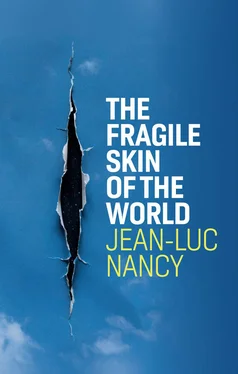It is extremely tempting at this point to protest that it makes no sense to think that man, and perhaps life and nature alongside him, might disappear in this passage to the limit of his own power. Why would it not make sense? The question can be asked. It is not clear that the value that we believe we attribute to man – and even the one we believe we attribute to life – is a value, in other words a sense worthy of this name. In fact, it may be that, if the sense of man and that of life were given by man himself, or indeed by life itself, they would remain far removed from what an infinite sense would demand! Hans Jonas assured us that our responsibility is ‘to ensure the permanence of an authentically human life on earth’. 5The term ‘authentically’ harbours a problem that paralyses from the outset the very idea of such a responsibility.
The idea of an authentic man or an authentic life can only be spoken of from a point of view that is neither human nor living, which is precisely what we lack.
It is impossible for us to decide in favour of an authenticity whose content is not indicated to us – or, on the contrary, if everything about this authenticity might lead us to consider that its content is to be found precisely in the endless deployment of an autonomous power, one that would have spread via man to the entire world. What if authentic man were the one by way of whom the final blaze of glory, and subsequent extinction of the ‘creative unconscious’, came to fruition?
One could do much worse than to consider the Heideggerian motif of the Brauch of man by being: the use of man by his own ex-istence – and thus the use of use itself, of its utilization, of its utility and its erosion [ usure ] as the erosion of sense itself. Because sense, after all, does not have to be interminable. It is rather infinite each time in the truth of its interruption: in an encounter, in a culture, in a work, in an existence. In this sense, it is interminable because it can always be interrupted and revive itself in or from its interruption (all of the issues concerning the ‘work’ come together in this point).
What makes us indignant is the ignominy of an injustice and a denial of humanity in the irresistible deployment of power. There is no resistance to this irresistibility that is not obliged, if it is a real resistance, to proceed by way of a re-questioning of what we believed we were able to name the ‘authenticity of human life’. Coming back to the beginning of my remarks, I would say: just as the saturation and the anxiety of Rome triggered the rise of Christianity (in all its ambivalence), in the same way it is not impossible to imagine that the saturation and the anxiety of our time – which has lasted for more than a century – may trigger a tremor, one that is also unforeseen and unidentifiable, one that also brings with it a line of flight with regard to the chain of succession in which we feel trapped.
What is most important is that this tremor can only be of the order of what Marx calls ‘spirit’ when he excoriates religion (and along with it, basically everything that claims to give a sense to the world) as ‘the spirit of a world without spirit’. What does the word spirit mean? It is without fail that which always arises unexpectedly and without identity. It is without fail that which is without past and without future – as the Son of God and autonomous Man once were. And if our time tests us with an injustice deprived of any horizon, it is certain that the spirit to come is that of a justice that no rearrangement or reform of today’s conditions can point towards.
I’m going to allow myself to cite a few lines that I wrote seventeen years ago. Less to claim to have foreseen this or that than simply to show that what is coming has perhaps traversed us and signalled to us for some time already. It was in a book whose title ( The Creation of the World or Globalization ) sought to mark a distinct contrast between emergence and transformation, between mutation and modification.
Here is the passage:
To create the world means: immediately, without delay, reopening each possible struggle for a world, that is, for what must form the contrary of a global injustice against the background of general equivalence. And to conduct this struggle precisely in the name of this: that this world is coming out of nothing, that it is without preconditions and without models, without any given principle or end, and that it is precisely this that forms the justice and the sense of a world. 6
What is entirely new, and what perhaps comes about without past or future, is the escape from all terminal signification. It is the sense that we do not control our ends and that they do not control us either, because all of this belongs to the domain of logics of investment and usage whose aim is an interminable renewal of a power that is as productive as it is destructive. We do not control the sense of the world, but nor, perhaps, are we controlled by power, if we are on the contrary employed ( gebraucht ), used, gamed [ mis en jeu ] by no master, by no signification, but by the simple fact of our being put into play [ mise en jeu ]. Our existence, according to the presence that comes and that comes to us, may be that which only exists by and for itself, for its own fructification (I allude here to the frui of Augustine, to the ‘enjoyment’ that Heidegger approximates to his Gebrauchtsein . Not enjoying oneself, as with the Hegelian spirit, but being enjoyed . . .).
Here, now, I am employed, used, called upon, exploited, enjoyed by an infinity that is neither a subject nor a scheme – that thus has nothing in store for me and makes no profit from me – but that is my very existence, the fact that this existence is sent, expedited to its sole actualization of being – this body, these words, this thrust, this chance in the sense that all of these are here and now exposed, dedicated, abandoned to infinitely more than themselves.
It is not a thought that is easy to grasp, and it is not a thought at all: it is a praxis , an ethos , a lived and living disposition that in a sense we are already familiar with without even knowing it. Because it is not an object of knowledge. It is rather the fact of a jolt, of a gap with respect to the usual logic that uses us up and wears us out. A disjunction, a breakdown – as well as a divine surprise.
1 1 Lecture given at the ‘Thinking with Jean-Luc Nancy’ conference, organized in Oxford in March 2019 by Marie Chabbert and Nikolas Deketelaere; the initial version is forthcoming in the conference proceedings.
2 2 Octavio Paz, ‘A Tale of Two Gardens’, The Collected Poems of Octavio Paz 1957–1987, ed. and tr. Eliot Weinberger, New York: New Directions, 1987, p. 295. Praise be to Hélène, to a degree commensurate with the revelation of this face. [TR: I have slightly modified the translation. The original reads: ‘la otra cara del ser,/la vacía,/el fijo resplandor sin atributos’. Weinberger translates the second line as ‘the feminine void’.]
3 3 Paul Valéry, Cahiers II, Paris, Gallimard, coll. “Bibliothèque de la Pléiade,” 1974, p.1533. [TR: My translation.]
4 4 Ibid., p.1352.
5 5 Hans Jonas, The Imperative of Responsibility, tr. Hans Jonas and Davis Herr, Chicago: University of Chicago Press, 1984, p. 11. [TR: I have modified the translation to bring it more into line with Nancy’s French version, which runs thus: ‘d’assurer la permanence d’une vie authentiquement humaine sur terre’.] More than twenty years ago, Élisabeth de Fontenay formulated very nicely that which prevents us from relating to authenticity: ‘The lack of criteria compels us to respond in the absence of all points of reference, to maintain this empty demand that precedes the subject and exceeds all authority’ (‘Quelque chose comme du donné . . .’, Paris, Autrement, série ‘Morales’, no. 14, ‘La Responsabilité’, 1994).
Читать дальше












